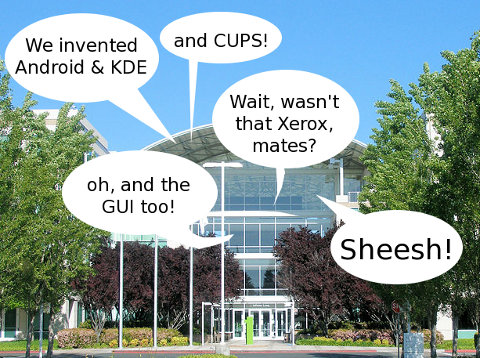09.01.15
Posted in Deception, DRM, Free/Libre Software, Microsoft, Office Suites, Open XML at 6:31 pm by Dr. Roy Schestowitz
“DRM is the future.”
–Steve Ballmer, Microsoft CEO
“We’ve had DRM in Windows for years. The most common format of music on an iPod is “stolen”.”
–Steve Ballmer, Microsoft CEO
“We’ve been very focused on producing a DRM system. [...] We think DRM is important”
–Robbie Bach, Microsoft President
“DRM is nearly always the result of a conspiracy of companies to restrict the technology available to the public. Such conspiracy should be a crime, and the executives responsible for it should be sentenced to prison.”
–Richard Stallman

Summary: What Microsoft et al. call ‘Next-Generation Open Media Formats’ are basically neither open nor acceptable (it’s DRM) and what Microsoft apologists dub ‘Open Source Tools’ are just another example of a Microsoft Office openwashing Trojan horse
“Alliance for Open Media” is the latest Orwellian name/title for that which casts DRM collusion as “open”. Typical DRM proponents are part of it (Microsoft included) and so is Mozilla, which joined the DRM cartel about a year ago, causing much anger among many of its strongest supporters. DRM is not “open”. It’s not even compatible with the notion of “open” as this strictly requires proprietary software. Mozilla gave up on “openness” when it entered the DRM conspiracy and now we have the press littered by lots of puff pieces that frame DRM as “open” (however they define open, maybe alluding to patents). These are manufactured false perceptions and spin, calling a DRM conspiracy “Next-Gen Video Format” [1, 2, 3]. Here is the press release. It’s hogwash.
It is sad to see the Open Web falling over like this, after the MPAA essentially bribed the World Wide Web Consortium, which had hired a fool from Novell (we wrote a lot about this in prior years). These people are trying to set up ‘standards’ with patents on them and DRM as part of the (secret) ‘standard’. When it comes to what they define to be “open”, it’s just about patents. When a bunch of companies agree not to sue each other (like OIN, which has just added WSO2, but proved rather fruitless when one member, Oracle, sued another, Google). “In joining OIN, an organization dedicated to defending the Linux ecosystem, WSO2 extends its commitment to fostering innovation through open source software,” says the summary from the new press release. That’s nothing to do with innovation. It’s nothing to do with FOSS, either. Many members are proprietary software companies just agreeing on patents being pooled together. Many of these patents pertain to sofwtare and are therefore inherently incompatible with FOSS. Therein lies the core of the latest spin, misleadingly named “Alliance for Open Media”. It’s not a standard but a collusion. That’s what it is. It is, at best, a patent pool.
In other news, we have just come across some truly bizarre openwashing of Microsoft Office. Sam Dean is once again doing a service to his apparent new hero, Satya Nadella. Under a rather misleading headline Dean describes something which facilitates proprietary software as “Open Source”. But it’s not open source, it’s bait for OOXML and proprietary software. Watch the article starting with nonsensical claims:
Has Microsoft finally, truly warmed up to open source? New CEO Satya Nadella (shown) is definitely pushing that notion. Several media outlets previously reported on his comments on how he “loves Linux” and he has claimed that approximately 30 percent of Microsoft’s Azure cloud is already Linux-based.
Any GNU/Linux instance running under Microsoft’s control is already compromised, with back doors included. It’s basically dependent on proprietary software from a company which notoriously colludes with the NSA.
Talk about distorting the notion of “openness”…
Those who can successfully ‘sell’ the corruptible media OOXML, Office and DRM as “open” can probably also ‘sell’ it genocidal carpet-bombing as “spreading freedom and democracy”, or disabled people as “special people”. █
“[Vista DRM] seems a bit like breaking the legs of Olympic athletes and then rating them based on how fast they can hobble on crutches.“
–Peter Gutmann
Permalink
 Send this to a friend
Send this to a friend
05.18.15
Posted in DRM, Microsoft at 6:46 am by Dr. Roy Schestowitz
Summary: Microsoft is showing off its kill switches, kills consoles of people whom it doesn’t like
SEVERAL days ago interesting reports surfaced about Microsoft remotely bricking people’s consoles, not just Microsoft having the capability to do so. “It turns out,” says one article, “that Microsoft not only has the power to ban you from Xbox Live permanently, but it can also turn your Xbox One console in to a useless brick, as the beta testers behind the Gears of War Remastered leak have found out.”
The lesson is clear; Microsoft claims ownership of what people buy (consoles), sabotages their consoles. Xbox One is not only an Orwellian surveillance device as we have explained before; it also has the capability to self-destruct at Microsoft’s orders. This isn’t going to be good for business. Microsoft has already lost a lot in this business. █
Permalink
 Send this to a friend
Send this to a friend
12.19.14
Posted in DRM, Patents at 11:12 am by Dr. Roy Schestowitz

Summary: Where two evils collide the public benefits, or how some software patents discourage the use of DRM
SOFTWARE patents are a horrible thing because in a world where almost everything is now controlled by computers with general-purpose or specialised software nearly every action/process can potentially become a monopoly, or a milking cow of someone (usually a large corporation) who had little to do with invention, just opportunism. It puts tremendous pressure on ‘small’ software developers and offers protectionism to software conglomerates such as IBM. Software patents are in injustice for many reasons including their undeniable impediment to innovation, which makes them the antithesis of patents (where publication in exchange for temporary monopoly was supposed to encourage dissemination of knowledge and thus innovation). Abstract ideas rather than utility were never supposed to be patentable. Likewise, copyright law has been extended to cover all sort of ridiculous things (like a story/plot, based on vague similarities, APIs, etc.) even to the point of encouraging no innovation or creativity (e.g. lasting well beyond the death of the original creator). The latter is often enforced upon the public using some ugly software hacks like DRM (turning computers against their users), so the relationship is deep and inherent.
“So here we have two evils fighting against one another. “It is rather ironic when software patents do something good by discouraging the use of DRM as DRM itself becomes a patent monopoly. Such was the case in this legal case. “Between the company’s general disposition and the incredible failure of the SimCity launch,” says an article, “Electronic Arts is becoming a name associated directly with digital rights management. The most infamous DRM platform the company has used is probably SecuROM, which was noteworthy for being equal parts mega-annoying to paying customers, as well as being so massively ineffective that games employing SecuROM later became amongst the most pirated video games of all time. But, results aside, EA would tell you that it needed to use DRM to protect the company from piracy. Even if SecuROM failed, the company had to at least try, or else the freeloaders that live the highlife getting around intellectual property laws would win. Violating IP laws is wrong, damn it, and EA was going to do everything in its power to right that wrong.”
So here we have two evils fighting against one another. It is not easy to pick a side. On the one hand we have monopolies on software and on the other we have monopolies on access to data. Both are detrimental to the common good. █
Permalink
 Send this to a friend
Send this to a friend
12.06.14
Posted in Apple, Courtroom, DRM at 5:23 am by Dr. Roy Schestowitz

Summary: Steve Jobs recalled for his reasonably hostile track record of megalomaniac tendencies
ONE of our readers sent us some interesting reports about Steve Jobs’ rudeness [1], determination to attack Android/Linux with patents [2], and a lawsuit [3] over DRM [4] where Steve Jobs’ ghost is back to haunt digital freedom.
“He also started a wave of patent abuses, ranging from threats (like those veiled threats against Palm) to lawsuits that would last several years and drain budgets, remove features, etc.”Over the years we have criticised Steve Jobs (before and after his death) because his contribution to DRM — contrary to what Apple fans care to admit — has been great. He also started a wave of patent abuses, ranging from threats (like those veiled threats against Palm) to lawsuits that would last several years and drain budgets, remove features, etc. So much for innovation, eh?
We continue to reject the notion that just because someone is dead it should be impossible to criticise him or her, especially if that person is a public figure (like a politician). Sadly, however, some people disagree and want to treat any criticism of Jobs like blasphemy or “speaking ill of the dead” (inducing censorship). As the reports below serve to show, Jobs does not deserve to be treated as though he was a hero, except perhaps by those who cherish corporate control over people, using digital means (that’s why the corporate press loves to idolise Jobs so much). █
Related/contextual items from the news:
-
Emails sent by Jobs have surfaced once again in a class action lawsuit brought against Apple (AAPL, Tech30) for making iTunes the exclusive store for iPod music. Jobs’ emails are characteristically frank, which could hurt Apple.
Jobs’ famous candor wasn’t limited to face-to-face encounters. His brusque manner translated to email as well. That’s unusual for modern CEOs, who are trained to exercise restraint in emails. Those words can easily be entered as evidence in a trial.
Either Jobs didn’t get that message — or he didn’t care. These 10 emails from Apple’s co-founder reveal the stern, outspoken and often witty personality that made him one of the most charismatic CEOs of his era.
-
Anyone who follows the smartphone and tablet market knows that Android has become the No. 1 mobile operating system in the world. They also know that, prior to his death in 2011, Steve Jobs was not very happy about Google’s mobile operating system. In fact, he made a rather bold threat when he talked about his dislike of this competing mobile OS.
“I will spend my last dying breath if I need to, and I will spend every penny of Apple’s $40 billion in the bank, to right this wrong. I’m going to destroy Android, because it’s a stolen product. I’m willing to go thermonuclear war on this,” the late CEO famously said.
-
-
This morning, Apple will begin a duel over claims that it used copy-protection schemes known as “digital rights management,” or DRM, to illegally manipulate the market for iPods. The lawsuit, filed nearly 10 years ago, puts some legal firepower behind activists’ claims that the copy-protection DRM is “defective by design.”
Permalink
 Send this to a friend
Send this to a friend
06.07.14
Posted in DRM, Microsoft, Mono at 7:08 am by Dr. Roy Schestowitz
Nasty DRM pipeline

Summary: Putting DRM on GNU/Linux, and especially DRM that Microsoft controls, is a very bad idea
Microsoft tried to break the Web with Silverlight, turning the Web into a bunch of binaries or cryptic blobs that will be run by proprietary software on the user’s computer/client’s end (probably not spiders, except for Microsoft’s). It is worse than Flash and more like DRM, which Silverlight was used to promote. When Silverlight died its key proponent Netflix had to go infect HTML. This is even worse because it means that the Web itself starts requiring proprietary blobs. One site said this is “Good news for folks tired of installing Microsoft Silverlight just so they can stream videos from Netflix: The company now has an HTML5 media player which works without any plugins.
“Here’s the bad news (for now): While Netflix is rolling out its HTML5 player to another platform, you still have to jump through some hoops to install Silverlight if you want to watch Netflix on a computer running GNU/Linux.”
Well, this is about DRM in HTML, which is even worse and has put Mozilla to shame. Mozilla also got a little close to Mono, which does not invite much support.
Now, using the Mono-based Moonlight one could almost get this DRM going, but it helped Microsoft get a foothold on the Web. One project remains which still tries to achieve this. It received coverage in some FOSS sites, which is unfortunate. One site said: “Pipelight is a wrapper for Windows NPAPI plugins such as Silverlight, Widevine or Flash (the Windows version) which allows you to use these plugins in native Linux web browsers and thus, use services that aren’t officially supported on Linux, such as Netflix (Silverlight), HBO Go (Widevine) and so on.”
Another bit of coverage said:
Pipelight is the interesting open-source project to support Windows browser plug-ins within native Linux browsers. Pipelight serves as a wrapper for Windows plug-ins in Linux browsers using Wine and for browsers supporting NPAPI plug-ins. This software, which allows Silverlight and Netflix to work on Linux, is out with a big update.
This is about DRM and it should be rejected or worked around by breaking DRM, not by bringing DRM to GNU and Linux.
The fight here is not just against Microsoft but against DRM. What Pipeline does helps create the perception that GNU/Linux is now compatible with DRM. Some copyright maximalists can use that to impose DRM everywhere. A Slackware-oriented site, writing about a similar issue, noted that support is lacking, so it really is only the illusion of compatibility.
The version 35 of Chromium has a major side effect that many people are not going to like. The support for browser plugins that use Mozilla’s NPAPI protocol to communicate with the browser has been removed and only Google’s own PPAPI protocol is supported as of now (MS Windows users still have a bit of time before the same happens to their Chrome browser – removal of NPAPI support in Windows is scheduled for the end of 2014). This step was of course announced long time ago and many reminders were posted, but if you need Java support in your browser, or want to watch Netflix using pipelight, then you are out of luck. PPAPI versions for these browser plugins do not exist and in the case of pipelight, are very hard to create.
Anything that requires running a blob for access to data/information should be rejected, especially on the Web. We are entering a dangerous era where FOSS become fundamentally incompatible with data. Unless of course we fight back… █
Permalink
 Send this to a friend
Send this to a friend
05.22.14
Posted in DRM, Free/Libre Software at 10:56 am by Dr. Roy Schestowitz

Photo by Darcy Padilla
Summary: A look at Brendan Eich’s musings from some months ago reveals hostility, as a matter of principle, towards DRM and some other items which suggest turf wars might be going on inside Mozilla
This sure is fascinating. Following the widely-chastised decision to embrace DRM it turns out that Eich was against the decision. We congratulated him for being a FOSS proponent who can end Mono dependence back when he was first appointed CEO and even before that. Remember that the patron of Firefox, Mozilla, was quick to embrace Ogg (we love Ogg), but later disappointed many of us by liaising with MPEG-LA (essentially stomping on the whole policy of supporting Ogg at the core). There certainly seems to be a turf war inside Mozilla. This is probably why Eich got ejected (through intense pressure on him).
With DRM and MPEG, Mozilla Firefox is no longer a FOSS browser. According to this one new blog post, DRM was why Brendan Eich had to go. “Eich stood firmly in the way of Mozilla incorporating DRM into Firefox,” says the source. Eich is a FOSS supporter, so this makes sense. Without him, Firefox can become FOSS only in the Chrome sense (FOSS with many blobs on top). Here is what Eich wrote in his site: “I continue to collaborate with others, including some in Hollywood, on watermarking, not DRM.”
He also said “DRM is about gaining leverage over “playback devices” and ultimately “users” in order to jack prices a bit” (source). To quote another take on it:
Eich stood firmly in the way of Mozilla incorporating DRM into Firefox. Now that he’s gone, and his technological authority with him, Mozilla immediately caved to Hollywood interests. It’s also interesting to note that the justification for Mozilla making this change is given as fear that users will abandon them. That demonstrates that the campaign to #uninstallfirefox was based on a sound principle, even if it was not quite as successful as I would have liked it to be.
Well, guess what, Mozilla? The treatment of Eich and promotion of DRM will do huge harm to Firefox and Mozilla. Many people disagreed with a position that Eich held outside his professional field half a decade ago, but those same people strongly disagree with the way some people in Mozilla treated Eich, not to mention the actions taken after his departure. Mozilla seems to be suffering an identity crisis of some kind. █
Permalink
 Send this to a friend
Send this to a friend
05.17.14
Posted in DRM at 5:49 am by Dr. Roy Schestowitz
Summary: Mozilla makes an error by not staying true to the principles that made it popular in the first place
Mozilla has been trying to sell us a controversial new interface (which many people want to replace [1]) for its flagship product Firefox, changing the controversial plan with ads etc. while it is using a kids-washed marketing campaign and claiming to teach about the Web [2,3]. This is after struggling with a PR disaster (the Eich incident) that distracted from Mono issues. One sure thing is, Mozilla is going through a tough time. This is not a good thing at all because Mozilla has historically been a champion of standards and source code.
Mozilla is seemingly trying to make things worse by ignoring hostile feedback (from months ago) to its DRM plans. DRM and FOSS cannot co-exist, so Mozilla abandoned FOSS instead of rejecting DRM. Mozilla is now contradicting itself. It weakens FOSS as a whole.
Well, Microsoft and DRM boosters make it even worse, trying to bolster the case for DRM using Mozilla. Across the Web there is plenty of anger, including an expression of disappointment at Mozilla’s actions. Prominent DRM foe Cory Doctorow [4] says that this position [5] breaks his heart and Linux-centric sites [6] paint this scenario more properly than most (many journalists don’t really understand these matters). Free software people have condemned Mozilla [7,8], but there is no chance of Mozilla changing course just yet. Two of our readers have said they they would dump Mozilla over this issue (not just Firefox but Mozilla).
Truth be told, the W3C deserves a lot of the blame as well. It has been an utter disgrace in the past couple of years and Tim Berners-Lee let it be so, with Novell’s Jaffe making erroneous decisions that isolate the Web that’s already a surveillance platform of notorious proportions. Most Web browsers in use FOSS code, but the W3C decided to ban FOSS with DRM, promoting proprietary software and hence more surveillance. The W3C deserves much of the flack and it deserves much of the blame for Mozilla’s own actions.
Articles about the fiasco mostly blame Mozilla for this, but some say that it’s not Mozilla’s fault, which is partly true. Sam Dean, who is typically okay with some proprietary software like Mac OSuX, obviously disagrees with Mozilla as he says: “Now, Mozilla–a champion of openness on the web–has teamed up with Adobe to provide a Content Decryption Module (CDM) that effectively hitches its wagon to streaming video DRM (digital rights management) in the Firefox browser after years of eschewing the practice.”
In another article, Dean says that “The FSF isn’t the only organization condemning Mozilla for the move. The Register refers to the decision as an “ankle grab.””
Other sites noted the same alignment in position among “Open source advocates” and some news site wrongly frame this as “bring[ing] Netflix support to Linux with DRM in Firefox” (this is not really what the news should say).
SOFTWARE DEVELOPER MOZILLA has announced the implementation of proprietary HTML5 based digital restrictions management (DRM) in its Firefox web browser, such as that used by media streaming services.
It is much worse than that. It is an assault of Free software, it is not about augmenting support. To save/keep its biggest fanbase Mozilla will need to dump Adobe and abandon DRM immediately. A week ago Asa Dotzler thanked personally me for supporting Mozilla; well, I’m not sure I support Mozilla anymore. I wait for Mozilla to rectify its act. █
Related/contextual items from the news:
-
-
-
Almost two years after launching its Webmaker initiative, Mozilla is launching a new online crash-course to give anyone the skills to teach other people about using and building on the Web.
It’s called Webmaker Training and features four modules covering the basics of the Internet, how to use Mozilla’s current crop of Webmaker tools, nurturing open learning and engaging with other communities on the Web.
-
Future versions of the open-source Firefox browser will include closed-source digital rights management (DRM) from Adobe, the Mozilla project’s chief technology officer, Andreas Gal, announced on Wednesday.
The purpose is to support commercial video streams. But this is a radical, disheartening development in the history of the organisation, long held out as a beacon for the open, free spirit of the web as a tool for liberation.
As Gal’s blogpost makes clear, this move was done without much enthusiasm, out of a fear that Firefox (Mozilla’s flagship product and by far the most popular free/open browser in the world) was being sidelined by Apple, Google and Microsoft’s inclusion of proprietary technology to support Netflix and other DRM-encumbered videos in their browsers.
-
With most competing browsers and the content industry embracing the W3C EME specification, Mozilla has little choice but to implement EME as well so our users can continue to access all content they want to enjoy. Read on for some background on how we got here, and details of our implementation.
-
-
In response to Mozilla’s announcement that it is reluctantly adopting DRM in its Firefox Web browser, Free Software Foundation executive director John Sullivan made the following statement:
“Only a week after the International Day Against DRM, Mozilla has announced that it will partner with proprietary software company Adobe to implement support for Web-based Digital Restrictions Management (DRM) in its Firefox browser, using Encrypted Media Extensions (EME).
-
In the old science fiction story, To Serve Man (which later was adapted for the The Twilight Zone), aliens come to earth and freely share various technological advances, and offer free visits to the alien world. Eventually, the narrator, who remains skeptical, begins translating one of their books. The title is innocuous, and even well-meaning: To Serve Man. Only too late does the narrator realize that the book isn’t about service to mankind, but rather — a cookbook.
It’s in the same spirit that Baker seeks to serve Firefox’s users up on a platter to the MPAA, the RIAA, and like-minded wealthy for-profit corporations. Baker’s only defense appears to be that other browser vendors have done the same, and cites specifically for-profit companies such as Apple, Google, and Microsoft.
Permalink
 Send this to a friend
Send this to a friend
03.25.14
Posted in Apple, DRM, Microsoft at 3:16 pm by Dr. Roy Schestowitz
Transmitting DRM-emcumbered and proprietary software-bound packets first

Summary: Those who advocate DRM and proprietary software dislike net neutrality, as demonstrated by Apple’s and Netflix’s opposition to the principle of packet delivery without discrimination
Microsoft has, for a long time in fact, been an opponent of net neutrality, based on its actions (we covered those). No company wants to be seen as anti-net neutrality, so they all pretend to be for it while their actions speak for themselves.
Netflix is clearly against net neutrality based on its actions and a reader sent us this article about Netflix’s CEO, noting that “ISPs are already getting paid for both ends of the connection. What ISPs are trying to get now is paying twice at both ends, that is to say collecting four ways for the same connection.”
The corporate press recently ran the story “Netflix Just Opened the Door to Paying ISPs More Access Fees” [1]. Disregard the spin and PR from the CEO of Netflix [2,3], who is basically claiming that he is against what he is doing. Also ignore the nonsense from AT&T [4] and other cable companies [5]; they just fear client alienation, so they tell to the public (existing or prospective customers) what the public wants to hear while doing exactly the opposite.
Apple, being Apple, is a lot more arrogant and selfish, hardly ever trying to hide its real agenda. Apple not only helps Microsoft [6] but it also helps cable companies kill net neutrality [7,8]. Apple is following the lead of Netflix in this case, ending what we once knew as a network which treats packets equally. █
Related/contextual items from the news:
-
Netflix (NFLX) Chief Executive Officer Reed Hastings is seeking your help to keep Internet service providers from charging higher fees to stream all the video its customers watch. In the process, he may have just opened his wallet to any Cox, Time Warner Cable (TWC), Verizon Communications (VZ), or AT&T (T) across the nation.
-
-
Netflix CEO Reed Hastings says it reluctantly pays US ISPs for interconnection fees, but argues providers shouldn’t be allowed to abuse their position
-
If the Federal Communications Commission lets Internet service providers charge Web companies like Netflix for faster delivery of content to consumers, AT&T will lower its customers’ Internet bills. That’s what AT&T said Friday in a filing in the FCC’s “Protecting and Promoting the Open Internet” proceeding.
-
Network operators Level 3 and Cogent Communications today urged the Federal Communications Commission to prevent Internet service providers from charging what they deem to be excessive fees for interconnection.
-
Windows 8 picks up an unlikely ally in Apple
Apple is dropping Windows 7 support in Boot Camp — and Mac-based Windows users won’t like the reasons why
-
GADGET MAKER Apple and ISP Comcast are planning a joint venture for streaming TV service, in a move that might ramp up the net neutrality debate.
According to the Wall Street Journal, the companies are in talks to create a service that will provide the Apple TV with a direct connection to a new video on demand (VOD) channel, bypassing internet congestion that could otherwise cause buffering or pixelation to customers.
-
We recently reported Netflix CEO, Reed Hastings talk about the essence of net neutrality saying that ISPs such as AT&T and Comcast should not restrict, influence, or otherwise meddle with the choices consumers make. If reports are to be believed, Apple is talking to Comcast to get priority services for its set-top box that will bypass any congestion created by internet traffic.
Permalink
 Send this to a friend
Send this to a friend
« Previous entries Next Page » Next Page »























 Content is available under CC-BY-SA
Content is available under CC-BY-SA